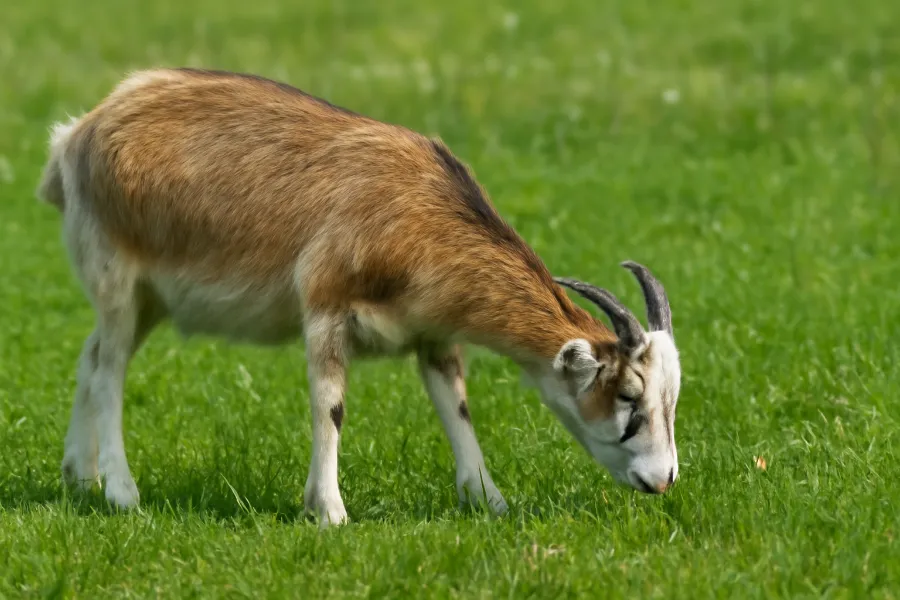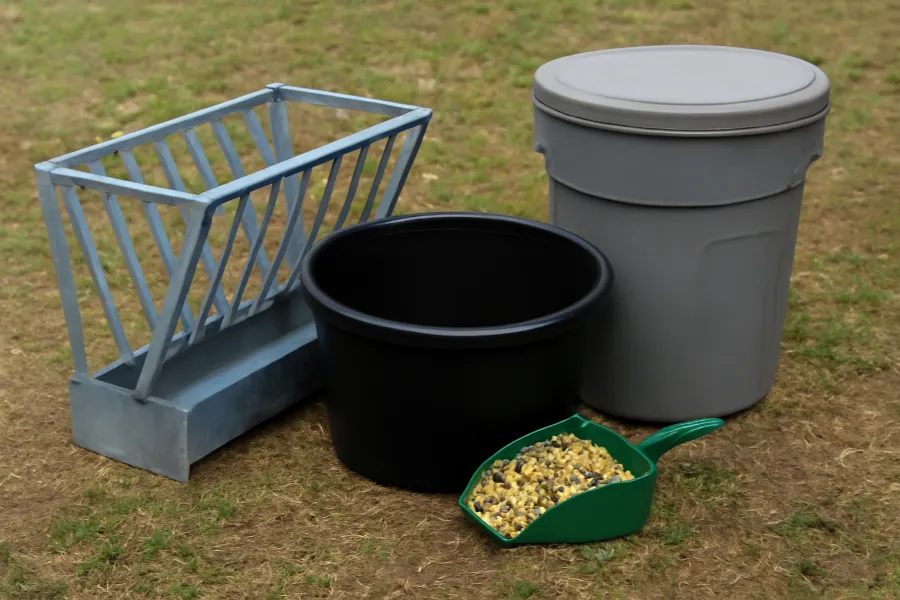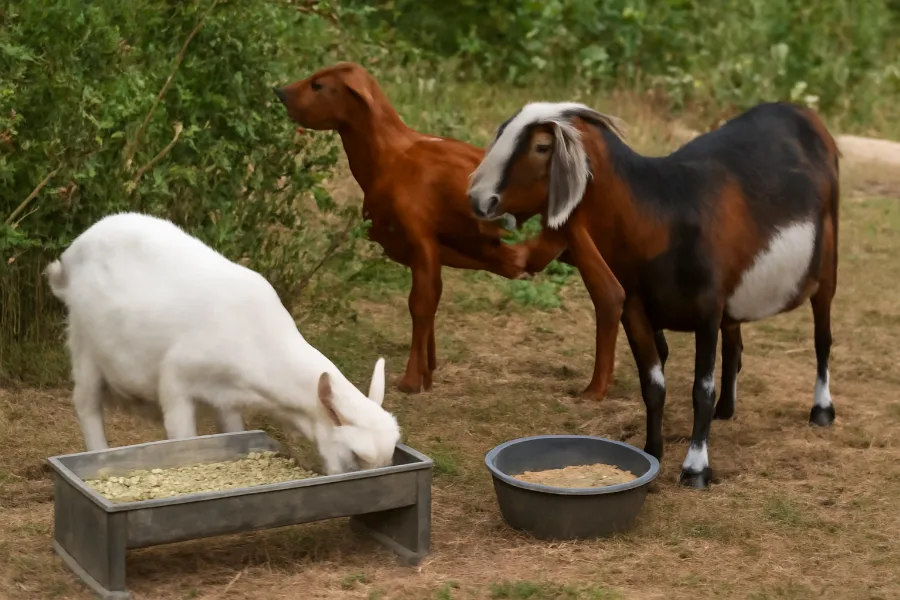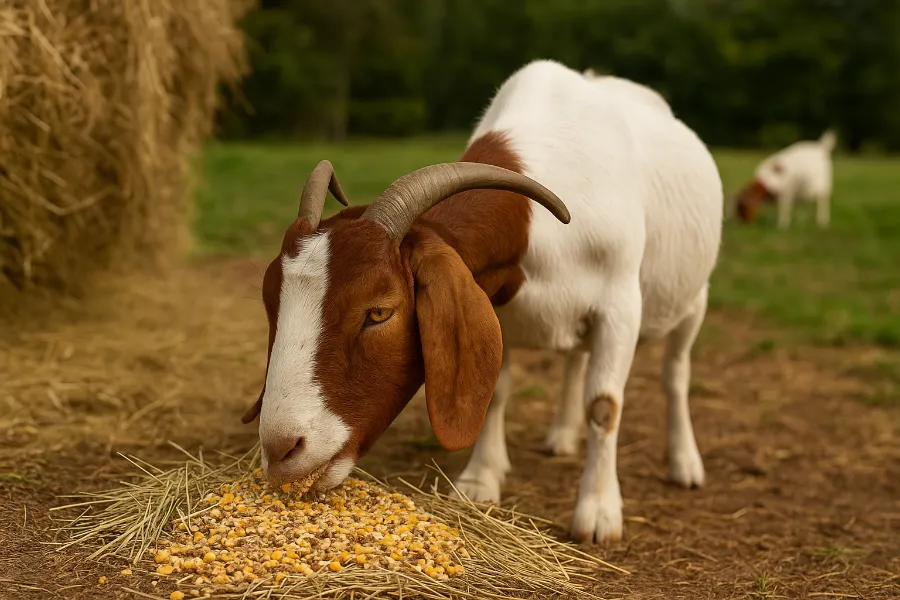If you’re raising goats—whether for milk, meat, or just as lovable companions—understanding their dietary needs is essential. One of the most common questions new goat owners ask is: “What should I feed my goats?” The answer isn’t just about choosing the right feed; it’s about providing a balanced diet that supports their health, productivity, and happiness.
In this guide, we’ll explore the ins and outs of goat food, including the role of sweet feed, the importance of a balanced diet, and best practices for feeding your goats.
Sweet Feed: A Tasty Treat or a Risky Choice?

Sweet feed is a popular choice among livestock owners. It’s a mix of grains like corn and oats, sweetened with molasses to make it more palatable. While goats love the taste, it’s important to use sweet feed cautiously.
Pros:
- Energy Boost: Sweet feed provides quick energy, which can be beneficial for pregnant or lactating does.
- Palatability: The sweet taste encourages goats to eat, which is helpful for picky eaters.
Cons:
- High Sugar Content: Too much sugar can lead to obesity and digestive issues.
- Nutrient Imbalance: Sweet feed shouldn’t replace hay or forage, as it lacks essential nutrients.
Tip: Use sweet feed as a supplement, not a staple. Always monitor your goats’ health and adjust their diet accordingly.
Goats Diet: More Than Just Feed
A healthy goats diet goes beyond sweet feed. Goats are ruminants and require a variety of foods to stay healthy.
Key Components:
- Hay: The foundation of a goat’s diet. Alfalfa or grass hay provides necessary fiber for digestion.
- Grains: In moderation, grains like oats can supplement a goat’s diet, especially for growing kids or lactating does.
- Browse: Goats love to browse on shrubs, leaves, and trees. This natural behavior adds variety to their diet.
- Minerals: Provide free-choice minerals to ensure goats get essential nutrients like calcium and phosphorus.
Remember, variety is key. A balanced diet supports healthy growth, reproduction, and milk production.
Goat Feed: Choosing the Right Options
Selecting the right goat feed depends on your goats’ age, purpose, and health status.
Types of Feed:
- Pelleted Feed: Easier to store and measure, pelleted feed is convenient but may lack the variety goats need.
- Loose Grain: Allows for mixing with other foods, but can lead to waste if not managed properly.
- Custom Mixes: Some owners create their own blends, adding grains, minerals, and other supplements.
Tip: Always choose feeds formulated specifically for goats. Avoid feeds designed for other livestock, as their nutritional needs differ.
Feeding Goats: Best Practices
Proper feeding goats involves more than just providing food. It’s about creating a routine and environment that promotes health.
Best Practices:
- Consistent Feeding Schedule: Feed your goats at the same times each day to establish a routine.
- Clean Water: Always provide fresh, clean water. Goats can drink up to 3 gallons a day.
- Proper Storage: Store feed in a dry, cool place to prevent mold and contamination.
- Monitor Health: Regularly check your goats for signs of illness or malnutrition.
By following these practices, you ensure your goats receive the best care possible.

Grain for Goats: A Nutritional Boost
Grain for goats can be beneficial but should be used sparingly.
When to Use Grain:
- Growing Kids: To support rapid growth.
- Lactating Does: To meet increased energy demands.
- Underweight Goats: To help them gain weight.
Caution: Overfeeding grain can lead to obesity and digestive problems. Always consult with a veterinarian before making significant changes to your goats’ diet.
Tools and Materials for Feeding Goats
Having the right tools makes feeding goats easier and more efficient.
Essential Tools:
- Feeders: Hay racks and grain bins help prevent waste and keep feed clean.
- Water Troughs: Ensure goats have access to fresh water at all times.
- Measuring Tools: Use scoops or cups to portion out feed accurately.
- Storage Containers: Keep feed in sealed containers to protect from pests.
Investing in quality tools saves time and ensures your goats’ needs are met.
Natural Food Sources for Goats
In addition to commercial feed, goats benefit from natural food sources.
Natural Foods:
- Pasture: Fresh grass provides essential nutrients and encourages natural foraging behavior.
- Browse: Goats enjoy shrubs, leaves, twigs, and bark. Browsing satisfies natural foraging behavior and provides diverse nutrients.
- Fruits and Vegetables: Apples, carrots, and pumpkins are healthy treats in moderation.
Tip: Rotate grazing areas to prevent overgrazing and parasite buildup.
Signs of a Healthy Goat Diet
How do you know if your goats are getting the right nutrition?
Indicators:
- Healthy Coat: A shiny, smooth coat indicates good nutrition.
- Active Behavior: Goats should be curious and energetic.
- Normal Feces: Consistent, firm droppings are a sign of proper digestion.
- Steady Weight: Regularly monitor weight to ensure goats are neither under nor overweight.
If you notice any abnormalities, consult with a veterinarian to adjust their diet accordingly.

Final Thoughts
Feeding goats is both an art and a science. By understanding their dietary needs and providing a balanced diet, you ensure your goats lead healthy, productive lives. Remember, each goat is unique, so observe their behavior and health regularly to make necessary adjustments.
If you have any questions or need further guidance on feeding your goats, feel free to ask. Happy goat keeping!
FAQs
The best food for goats includes high-quality hay, fresh grass, browse (like shrubs and leaves), and a variety of grains and minerals in moderation.
Sweet feed can be beneficial in moderation, especially for lactating does or growing kids. However, too much sugar can lead to obesity and digestive issues.
Goats should be fed twice a day with consistent schedules. They need access to hay and fresh water throughout the day, along with controlled portions of grains or sweet feed.
Sweet feed should be given as a supplement, not a daily staple. Excessive consumption can lead to weight gain and digestive problems in goats.
Grain should be fed sparingly and should not make up more than 10-15% of a goat’s total diet. Adjust based on the goat’s size, age, and energy needs.
Yes, goats enjoy fruits and vegetables like apples, carrots, and pumpkins. However, these should only be given as occasional treats and in moderation.
Goats require calcium, phosphorus, and trace minerals for bone health, reproduction, and milk production. Provide free-choice mineral blocks or loose minerals.













